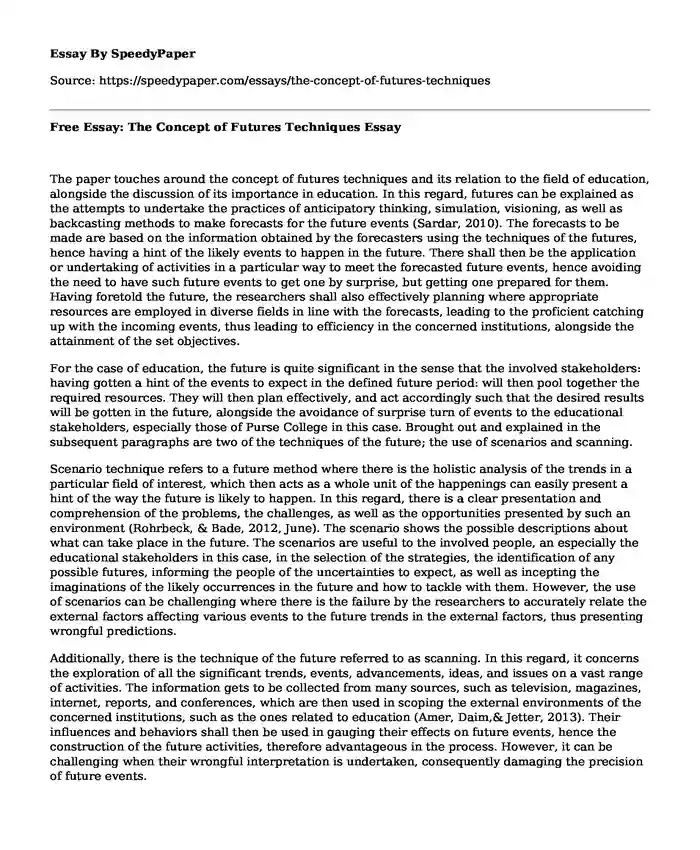
| Type of paper: | Research paper |
| Categories: | Planning Education Knowledge |
| Pages: | 3 |
| Wordcount: | 667 words |
The paper touches around the concept of futures techniques and its relation to the field of education, alongside the discussion of its importance in education. In this regard, futures can be explained as the attempts to undertake the practices of anticipatory thinking, simulation, visioning, as well as backcasting methods to make forecasts for the future events (Sardar, 2010). The forecasts to be made are based on the information obtained by the forecasters using the techniques of the futures, hence having a hint of the likely events to happen in the future. There shall then be the application or undertaking of activities in a particular way to meet the forecasted future events, hence avoiding the need to have such future events to get one by surprise, but getting one prepared for them. Having foretold the future, the researchers shall also effectively planning where appropriate resources are employed in diverse fields in line with the forecasts, leading to the proficient catching up with the incoming events, thus leading to efficiency in the concerned institutions, alongside the attainment of the set objectives.
For the case of education, the future is quite significant in the sense that the involved stakeholders: having gotten a hint of the events to expect in the defined future period: will then pool together the required resources. They will then plan effectively, and act accordingly such that the desired results will be gotten in the future, alongside the avoidance of surprise turn of events to the educational stakeholders, especially those of Purse College in this case. Brought out and explained in the subsequent paragraphs are two of the techniques of the future; the use of scenarios and scanning.
Scenario technique refers to a future method where there is the holistic analysis of the trends in a particular field of interest, which then acts as a whole unit of the happenings can easily present a hint of the way the future is likely to happen. In this regard, there is a clear presentation and comprehension of the problems, the challenges, as well as the opportunities presented by such an environment (Rohrbeck, & Bade, 2012, June). The scenario shows the possible descriptions about what can take place in the future. The scenarios are useful to the involved people, an especially the educational stakeholders in this case, in the selection of the strategies, the identification of any possible futures, informing the people of the uncertainties to expect, as well as incepting the imaginations of the likely occurrences in the future and how to tackle with them. However, the use of scenarios can be challenging where there is the failure by the researchers to accurately relate the external factors affecting various events to the future trends in the external factors, thus presenting wrongful predictions.
Additionally, there is the technique of the future referred to as scanning. In this regard, it concerns the exploration of all the significant trends, events, advancements, ideas, and issues on a vast range of activities. The information gets to be collected from many sources, such as television, magazines, internet, reports, and conferences, which are then used in scoping the external environments of the concerned institutions, such as the ones related to education (Amer, Daim,& Jetter, 2013). Their influences and behaviors shall then be used in gauging their effects on future events, hence the construction of the future activities, therefore advantageous in the process. However, it can be challenging when their wrongful interpretation is undertaken, consequently damaging the precision of future events.
In conclusion, futurology and its construction techniques, when appropriately utilized in the prediction of future events, can be of great use as presented above in the study of future events.
References
Amer, M., Daim, T. U., & Jetter, A. (2013). A review of scenario planning. Futures, 46, 23-40.
Rohrbeck, R., & Bade, M. (2012, June). Environmental scanning, futures research, strategic foresight, and organizational future orientation: a review, integration, and future research directions. In ISPIM Annual Conference.
Sardar, Z., (2010). The Namesake: Futures; futures studies; futurology; futuristic; foresight-What's in a name?. Futures, 42(3), 177-184.
Cite this page
Free Essay: The Concept of Futures Techniques. (2023, Jan 12). Retrieved from https://speedypaper.net/essays/the-concept-of-futures-techniques
Request Removal
If you are the original author of this essay and no longer wish to have it published on the SpeedyPaper website, please click below to request its removal:
- Free Essay on Strategic Planning at the Chronicle Gazette
- The Development of the Human and Technology. Essay Sample.
- Free Essay: The Relationship Between Life Expectancy and Mortality Rate
- Essay Sample: Alberta Community Food Bank Proposal
- Essay Example on Leadership Competencies Revisited
- Analytical Essay on "A Rose for Emily", Free Example
- Paper Example. The North Coast Masks
Popular categories




